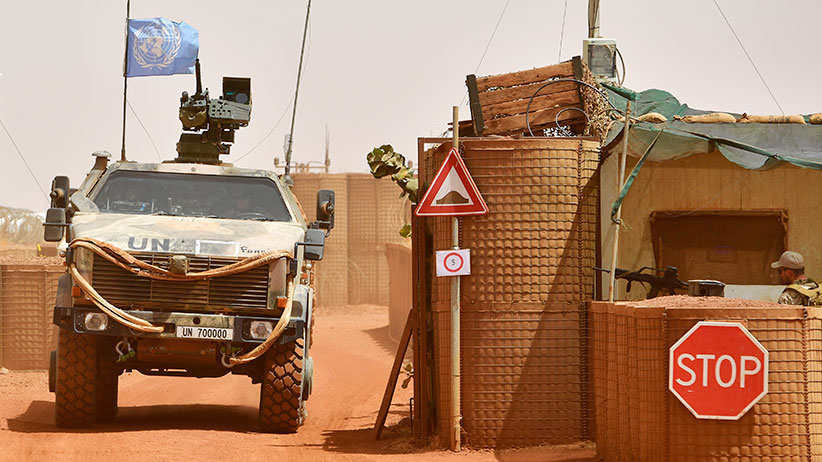The carnage in Mali while Trudeau delays
On Canada’s possible peacekeeping role, the Liberals have offered an awesome extended display of dithering
A Dingo tank of the Bundeswehr, the German armed forces, enters Camp Castor after returning from a trainings mission on March 6, 2017 in Gao, Mali U.N.-led MINUSMA (United Nations Multidimensional Integrated Stabilization Mission) troops are assisting the Malian government in its struggle against rebels that include a Tuareg movement (MNLA) and several Islamic armed groups, among them Al-Qaeda, in the north of Mali. Rebels have conducted a series of terror attacks to destabilize the current government in recent years. The Bundeswehr has committed helicopters and 750 soldiers to the MINUSMA mission as well as 147 soldiers to the EUTM mission (European Trainings Mission Mali) to train government troops. In mid-April the Bundeswehr is to deploy four «Tiger«combat helicopter. (Alexander Koerner/Getty Images)
Share

Here’s how 2017 is going in Mali.
In January a vehicle packed with explosives drove into a military camp in Gao; 80 people were killed. (This early story puts the number at 50, but it grew.) In mid-April an armed attack on a camp east of Timbuktu killed four. At the end of the month, French forces said they had killed at least 20 jihadists on the border with Burkina Faso. Days later, eight Malian soldiers were killed in an ambush near the town of Nampala. A rocket attack on Liberian soldiers in Timbuktu killed one immediately; three more died on the way to the hospital. Fifteen Malian soldiers have been killed in a series of incidents in the country’s north in the past two weeks. Some accounts put the civilian death toll so far this year at 150.
It’s a slaughterhouse, it extends into other countries, and on both sides the combatants, tired of fighting this combination of a civil war (or string of civil wars) and a terrorist insurgency, have started to team up. State authorities in Mauritania, Mali, Burkina Faso, Niger and Chad are combining their efforts, with French assistance and U.S. logistical help. On the other side, several militant groups—Ansar Dine, Al-Mourabitoun and al-Qaida in the Islamic Maghreb—have merged into a new group, Nusrat al-Islam wal Muslimeen.
It’s all hands on deck, or would be if Canadians were anywhere to be seen.
A decision on a peacekeeping mission is “now delayed for months,” the Toronto Star reported this morning. The United Nations held the command of a UN force in Mali open for months, in the hopes that a Canadian would be assigned to lead the mission. Eventually they gave up.
The Trudeau government is studying things. “We’re going to make sure that we take the time necessary to establish the right path forward,” the Prime Minister said in early March.
“We need to make sure… we make the right decision,” the Prime Minister said in late March.
“We have to make sure that it’s the right approach,” the Prime Minister said today.
When will they decide? “I haven’t set a date,” the defence minister said last August. “I can’t put a date to the decision,” he said in January.
Another element of the prime minister’s stock responses on this topic, on the occasions when reporters run out of other topics and ask him about peace operations, is to assert that all of this is making Canadians proud. “The commitment we have made as a country to reengaging with United Nations peacekeeping is one that I think all Canadians are proud of,” he said in March. It’s “not just altruism,” he said today. “Canada does better” in a world with more “stability.”
Meanwhile the Sahel is not getting more stable. Many dozens of people have died horribly while the government of Canada thinks about eventually getting around to maybe thinking about possibly deciding whether to commit to something eventually maybe resembling something like a military deployment. The exasperation in the voice of diplomats when they talk about this awesome extended display of dithering is formidable. Because it’s not as though nobody is taking the risk, while Justin Trudeau tells himself Canadians are proud. Other countries are taking the risk and bearing the cost.
It would be a dangerous mission. It will be approximately as dangerous next January, if Canadians undertake it, as it would have been last January, if Canadians had undertaken it. Waiting won’t make it less dangerous. If it’s too dangerous, the prime minister should say so. If it isn’t he should act.